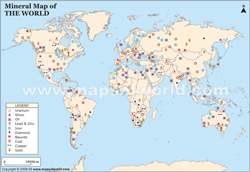Mineral Producing Countries

Minerals are essential nutrients required by our body to stay healthy. Whether its for building bones, making hormones and regulating your heartbeat, minerals are necessary for all metabolic processes.
What are Minerals
Minerals are solid chemical substance that are formed through bio-geo chemical processes. These occur naturally and range from pure elements and simple salts to very complex silicates.
Minerals can be classified both according to physical and chemical properties. The major minerals include talc, iron, copper, aluminum, gypsum, apatite, topaz, quartz, corundum, diamond, calcite, fluorite, silicon, oxygen, magnesium, manganese, and antimony.
Quartz and Feldspar are the two-most common minerals found in the Earth’s crust.
On the basis of the minerals required by living organisms, minerals are classified into two types: macro-minerals and trace minerals. Macro-minerals are those minerals that or body requires in large amounts. They include calcium, phosphorus, magnesium, sodium, potassium, chloride and sulphur. Trace minerals are required in smaller amount. These include iron, selenium, fluoride, manganese, copper, iodine, zinc, and cobalt.
Minerals and mineral resources are used by all of us in everyday life.
They are used for building roads, buildings, and other everyday purposes. Aluminum and its alloys are the most widely used; they are used in automotive and airplanes, canning industries, kitchen cookware, building and personal products like perfumes and deodorants.
Diamond is one of the most precious minerals found and is used in machinery, mineral services, abrasives, construction, and drilling.
Learn about the major minerals, their uses, and the places that they are most found in by clicking on the links on the left hand side of the page.